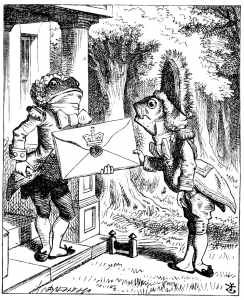A Whackadoodle discussion on what happened when my early morning telemarketer called me back, and I offered to send him a link to the article he’d inspired. If you haven’t read it already, you should probably click here to read Part One before you read Part Two.
An nearly true story by Lynn Marie Sager
It never fails, my smartest students always have one more question before they leave our tutoring sessions. This time it was unexpected, “Did you ever send that guy your article?” she asked, beginning to shove her books into her backpack.
“What guy?” I asked surprised.
“The telemarketer that you wrote about in your article,” she said, still tossing books into her bag. “The one about the sales process.”
“Oh! That guy. I thought about it, but then I thought it would be a bad idea. After all, what good would it have done?”
“He might have learned about how to approach prospects better.”
“Turns out,” I smirked. “He didn’t.”
“What do you mean?” She looked up surprised. “You said that you didn’t send it.”
“I didn’t send it at first,” I confessed. “But then he called me two days later, all chipper, and helpful, and ready to offer me more advice.”
“So what happened?” she asked, sitting back down and tucking her fists under her chin.
“I interrupted him in the middle of his prepared spiel and said in my best chipper and helpful voice, ‘Hey, you know that conversation we had the other day really inspired me, and I wrote an article about it. Would you like me to send you a link?’”
“What did he say?”
“What could he say?” I laughed. “He was so startled and shocked, and perhaps a wee bit curious. He said, ‘Sure, I’ll check it out and get back to you.’ Then we exchanged good-byes very cordially.“
“So it was a short call?”
“Very short.”
“And you loved that.”
“I adored it.”
“And?”
“I sent him the link because I had promised to do so; along with a little note that the article was not meant to hurt, but to instruct.”
“And?” she repeated.
“He sent me a personal response the next day. One that was not on his company letterhead, nor with his usual signature of Senior Online Marketing Consultant. It basically said:
“Hi Lynn,
Great article! With all due respect, it is inaccurate. I was selling you a $10 account with marketing tools both you and I agreed would work for you. The moral of the story was, you didn’t have $10 to spend on this.
Lucky for you, we have a promo going on that gives you 50% off for your first three months. $5 per month to grow your business and sell more books. To me sounds like a no brainer, let me know if you want to take me up on the offer.
M—-
“Wow,” her eyes were wide. “He really wrote that?”
“Yep,” I nodded. “I guess he’d decided that he might as well burn me as a prospect.”
“So what did you do?”
“What any writer does,” I told her. “I wrote a response.”
“And?”
“It basically said:
Hi M—,
I can tell by your response that my article upset you. For that I am sorry. I intended it as instructive to others, not insulting to you. I hope that writing your response helped you to blow off steam.
And now with all due respect, let me refresh your memory. You were selling me a $10 dollar a month recurring payment, with marketing tools that I in no way agreed that I needed. I don’t like pop-ups. I don’t want new integration with Facebook, and I don’t need someone to help me upload my brand. I never agreed to needing any of the things you were offering, most of which I can do for myself for free. Something you would have known had you paused to ask. (Feature/Benefit/Reaction)
I mean, let’s face it. If we had reached an agreement that I needed your service, I would have given you my credit card number instead of feeling inspired by our conversation to write an article about not pissing off your prospects.
Your suggestion that I don’t have $10 is downright insulting, and a great way to build rapport.
Now you offer me a “No Brainer?” I don’t think you need any brains to know my grumpy choleric reaction to that.
I do agree with one thing in your response. I wrote a great article.
Lynn
“And how did he respond?” she asked anxiously?
“We will never know,” I assured her.
“Why not?”
“Because I will never send it. I decided to not be petty, and finally take my own advice about advice.”
“And that is?”
“That advice, when not specifically requested, is never really welcomed and less often heard. Too often it is more destructive than constructive. When you’re emotional, it’s always good to write down your thoughts, but it’s seldom good to hit send.”
“So why are you posting this now?”
“Because I place the odds of him ever seeing this post at less than a million to one, and I like to end my stories with a lesson.”
“And what’s the lesson?” she asked.
“What do you think it is?”
“I think that it’s because you were choosing your battles.” she declared. “You could have decided to write him back and ask him to explain why he thinks you need pop-ups, and facebook, and help with your brand. You could use your questions to build back trust and rapport. You could probably even persuade him that sales is not like marketing. You just don’t want to waste your time.”
“I suppose that is why choosing your battles is the first step in the process,” I conceded. “But why in particular do you think I abandoned this battle?”
“Well, I know why I think you did,” she said with narrowed eyes. “But I’m pretty sure my reason has nothing to do with yours.”
“I was thinking about Dr. Cialdini’s Universal Principles of Influence.”
“Oh,” she clapped her hands. “We just covered that. Let me guess, um.” A few seconds went by as her brain hummed. “It’s got to be Reciprocity. We feel obliged to return what we have been given. He tried to put you in your place, so you want to put him in his place.”
I snorted with laughter. If I had been drinking soda, it would have come out of my nose. “I hadn’t considered that one, but you are so right.” I told her.
“But if that’s not the one you were thinking about, which one is?” she asked seriously.
“I was thinking of Liking. You know. We are most influenced by people who are like us, or at least like minded. We like people who pay us compliments. We like people who appear similar. We like people who cooperate with us towards mutual goals. The Universal Principle of Liking simply states that we are more influenced by people who demonstrate those qualities.”
“And he demonstrated none of those qualities,” she added nodding.
“I’ve even taken away his A+ in Rapport,” I leand over to whisper.
“Why?”
“Because he lied to me from the beginning, or at least he only told me a half truth. His opening line during that first call was, ‘I’m calling to see how we can help you grow your business,’ when his real motive was to sell me on an upgrade. I think that’s why I got so pissed off in the original call when he asked me for my credit card number. His approach was all wrong.”
“What do you mean?”
“I knew what he was doing wrong. He should have used the upgrade as a feature during his presentation if he wanted to sell me on something. He should have used feature/benefit/reaction. He could have said that one feature was an upgrade, and that with an upgrade I would get this, that, and the other thing, then he could have asked me how I felt about upgrading. At which point, I would have told him that I didn’t feel like I needed this, that, or the other thing, and he would have realized how far he still needed to go in the sales process.”
She sat back abruptly. “And this guy is one of their senior online marketing consultants?”
“He might know something about marketing, but he doesn’t know much about sales. In the end, I simply didn’t like him, and because of that, I no longer like his company.” I shook my head sadly. “They’re still sending me these pre-programed emails telling me how many days I have left in my free trial.”
“I guess it’s a no brainer how you feel about them,” she teased.
“Let’s just say that I take a great deal of delight in deleting them.”
She nodded and finished shoving her supplies into her backpack. She asked without looking up, “Why is this sales process so important to you?”
“Because sales is everywhere no matter what you call it; influence, persuasion, psychology, diplomacy, campaigning, negotiation, marriage counseling, or even getting your kids to eat their vegetables. And people keep getting it wrong. The bad guys are winning because they have all the money and power. All we have left is our influence. I just wish we would use it more wisely. I mean, that guy used his influence to turn me against him and his company. How many people use their influence to turn people against them every day? Trust is so easy to destroy and so hard to build.”
She already had her backpack adjusted, “So we can vote, we can protest, we can build alliances, and we can influence,” she said without looking up. “I know one thing,” she glanced up. “I promise to not waste my influence on trying to talk people into crap they don’t need.”
_______
If you you enjoyed this post, please leave a comment below. It helps our algorithm.
It would also be great if you shared this post. It also helps our algorithm.
If you would like to join Lynn’s mailing list, or ask a Dear Navigator question click here

You can reach Lynn Marie Sager at
DearNavigator@gmail.com
Author:
- Navigating Life in a Whackadoodle World
- Finding Sense in a Whackadoodle World
- Teaching Logic in a Whackadoodle World
- Navigating Life Through Turbulent Tides
- A River Worth Riding: Fourteen Rules for Navigating Life


Want to sell someone something? I got a letter from a cousin with two brochures in it. One invited me to get in touch with my God the other was an invitation to the Churches Worldwide convention in Las Vegas. I hadn’t heard from him in years.
You have to build rapport with a person before you can convince them of anything. If you want to do business with someone they have to know, like, and, trust you. The best way to loose a friend is to invite them to dinner and give them an Amway presentation.
Want to learn how to influence others? Read the first article in this thread.